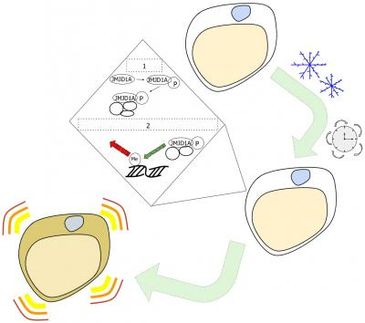Campus Vienna Biocenter Thriving Plant Research
Advertisement
At the Campus Vienna Biocenter research has begun into environmental stress-induced changes to the plant genome supported by the Austrian genome program (GEN-AU). A EUR 1.3 million budget has been allocated to the three-year project. Two task groups at the University of Natural Resources and Applied Life Sciences and five at the Campus will investigate how extreme environmental conditions impact on the plant genome. It is also hoped that evidence will be found to support the hypothesis that inheritable environmental adaptations of living organisms do not occur randomly. Confirmation of this would revolutionise current thinking about heredity.
But surely everyone knows mutations happen by chance, don¹t they? Researchers at the Campus Vienna Biocenter are not so certain, and this is precisely the question a three-year project there will now address. A total of 17 scientists will be looking into the effects of environmental stress on the genome of the model plant Arabidopsis with financial support from the Austrian genome program (GEN-AU), a program funded by the Ministry of Education, Science and Culture. They will also investigate whether stress reactions may contribute to further changes in the genome. If that were the case it would show that mutations do not simply arise randomly, but are also influenced by the plant metabolism and it would be time to re-write the textbooks.
Prof. Heribert Hirt of the Dept. of Microbiology and Genetics at the University of Vienna commented: "In the early 19th century it was widely believed that the adaptation of living organisms to their environment was a systematic process, and could be passed on to offspring. Darwin and modern genetics overturned these assumptions. According to them, inheritable adaptations are random. A few of them are beneficial, and are naturally selected. It is now known that random adaptations are caused by mutations. However for some time now there has been evidence that mutations are by no means as random as was thought. In lower organisms such as bacteria, in particular, it has been shown that mechanisms leading to an increased incidence of mutations are activated by certain types of stress."
The settled life style of higher organisms, and plants in particular, means that they have to resort to a wide range of reactions to adapt to environmental stress. The consortium of scientists in Vienna will now attempt to clarify whether changes in the plant genome can also arise from environmental stress. Such alterations include methylations of parts of the DNA or of associated proteins. These occasional chemical structure modifications regulate gene expression and precipitate environmental adaptations. But permanent genome changes such as base pair changes, or the multiplication of a single gene or whole chromosomes are also stress reactions. If it were demonstrated that these permanent, and hence inheritable changes are a specific reaction to environmental stress, this would mean that the plant influenced the environmental adaptations of future generations - a state of affairs at odds with current scientific teaching.
























































